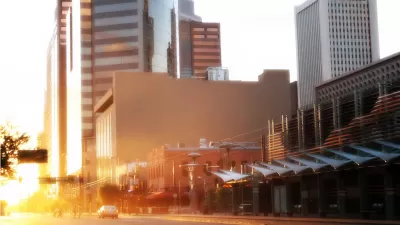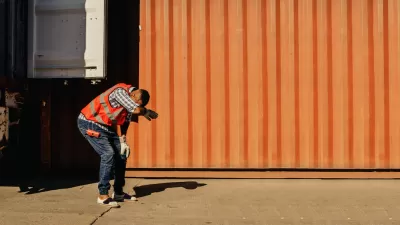As more extreme temperatures lead to an alarming rise in heat-related deaths across the country, Phoenix is taking action with the nation's first public heat response office.

As one of the nation's fastest-warming cities, Phoenix has seen a sharp rise in heat-related deaths as extreme temperatures become more commonplace. To address this growing public health crisis, the city has created the first publicly funded Office of Heat Response and Mitigation to tackle the problem of extreme heat and prevent heat deaths, which reached almost 500 in 2020. Jessica Kutz spoke with David Hondula, the director of the new office, to get a sense of how the city plans to develop a more comprehensive heat mitigation policy.
Hondula says the department will focus on coordinating a variety of short- and long-term heat mitigation strategies with other city departments and prioritizing cooling methods that meet local needs, such as increasing the city's tree canopy, installing cool pavement, and opening cooling centers for residents with no access to safe spaces in the extreme heat.
Hondula acknowledged the unequal heat burden faced by low-income communities, saying that his office will "steer the city’s investments in mitigation and response to the communities where there is the greatest need."
Earlier this year, Phoenix pledged to commit to 'tree equity' by 2030 by planting more trees in underserved neighborhoods and closing the green gap between high-income and low-income communities, where lack of shade exacerbates the effects of extreme heat.
FULL STORY: How to cool one of the fastest-warming cities in the West

Alabama: Trump Terminates Settlements for Black Communities Harmed By Raw Sewage
Trump deemed the landmark civil rights agreement “illegal DEI and environmental justice policy.”

Planetizen Federal Action Tracker
A weekly monitor of how Trump’s orders and actions are impacting planners and planning in America.

Why Should We Subsidize Public Transportation?
Many public transit agencies face financial stress due to rising costs, declining fare revenue, and declining subsidies. Transit advocates must provide a strong business case for increasing public transit funding.

Understanding Road Diets
An explainer from Momentum highlights the advantages of reducing vehicle lanes in favor of more bike, transit, and pedestrian infrastructure.

New California Law Regulates Warehouse Pollution
A new law tightens building and emissions regulations for large distribution warehouses to mitigate air pollution and traffic in surrounding communities.

Phoenix Announces Opening Date for Light Rail Extension
The South Central extension will connect South Phoenix to downtown and other major hubs starting on June 7.
Urban Design for Planners 1: Software Tools
This six-course series explores essential urban design concepts using open source software and equips planners with the tools they need to participate fully in the urban design process.
Planning for Universal Design
Learn the tools for implementing Universal Design in planning regulations.
Caltrans
Smith Gee Studio
Institute for Housing and Urban Development Studies (IHS)
City of Grandview
Harvard GSD Executive Education
Toledo-Lucas County Plan Commissions
Salt Lake City
NYU Wagner Graduate School of Public Service





























